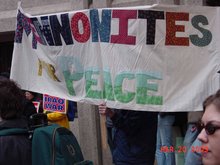November 30, 2009
by Ron and LouAnn Voth (rlvoths@msn.com)
We would like to respond to several statements at the November 22nd Peace & Justice Dialogue (with the four officers from the Command & General Staff College) that we didn’t have time to address:
1. Major Robert spoke of putting down his gun and using his mind in his military service as if that was not using violence.
Does this mean someone like Osama bin Laden or Khalid Sheikh Mohammed shouldn’t be accountable for the processes they facilitated on 9-11-01? We’re sure neither of them have personally initiated force for many years. They just facilitated and enhanced it’s use with their minds.
2. Major Robert spoke of a “CO” (Conscientious Objector) Commanding Officer.
Isn’t it odd for a Commander to order people to perform tasks they personally consider immoral? We try to imagine organizing someone to rob people because we can’t morally participate in stealing ourselves. It’s even more morally abhorrent to force someone else do something you personally believe to be wrong. Staying in his military position is either milking it for the benefits or not being brave enough to take a stand.3. We’d like to revisit the tax resistance stand.
We’d like to hear a military view on the logic of prosecuting mosque’s in the United States for funneling money to Al Qaeda or the Taliban. We presume the mosques are considered accomplices in terrorist efforts for providing financial support. How does that extrapolate to our military support through personal income taxes? Are we also accomplices in attacking Iraq when we finance it with our current tax structure?
4. We’d like to revisit the problem of pacifists living under the protection of the military but not contributing to their protection:
There is a difference between working for the American kingdom and working for God’s kingdom.
Countries like Canada and Australia have at least as much freedom as we do and didn’t have to go to war to get them. It’s the art of negotiation.
It is important to recognize what the military protects…..and it is not necessarily the citizens or the Constitution- Will the military protect us from a government that tortures, kidnaps people on foreign soil and removes them to countries that torture? Would the military stand up against attacking countries without proof of wrong doing in hand, or be the invasion force? Will the military stand against a government that releases the names of CIA agents (if acceptable, that same government might do the same to it’s military personnel) or fires Federal Judges for political gain? Will the military oppose secret prisons or serve as guards? Will the military refuse to hold people arrested without charges or even protest a government that spies and wire taps it’s citizens? Based on recent history, we suggest the military’s allegiance doesn’t allow for them to protect us from abusive governments or Constitutional violators and are likely forced by their authorities to be the enablers.
It is not the military that will oppose abusive governments. It is the people that create change. It starts as a minority opinion, and with logic, persuasion, and media exposure civilians are the eventual force for change. In that sense, the military needs our protection to keep their government from sending them into harm’s way unnecessarily, from forcing them to abuse prisoners, or be accomplices in abductions and secret prisons.
We don’t fault the military for this powerlessness. They aren’t allowed to insert themselves into the political realm due to laws prohibiting it. But, we will ask the question of who is protecting whom? They actually need someone not obligated to serve the authorities to expose the authorities.5. Our society will produce what we celebrate.
When the Iraq War is over, what will we put on the memorial? What will we want our society to remember about the war?
Here are our some of our choices:
a. The bust of a pacifist from Hesston College that negotiated with Iraqi leaders during the successful war-ending “surge.”
b. A checkbook that funded the war and paid Sunnis not to fight during the successful war-ending surge.
c. The dying face of a mother representing one of the 60,000 innocent Iraqi civilians that paid the ultimate sacrifice.
d. Or, the recruiting tool — a statue of one of the 5,000 soldiers killed while riding in an armored humvee.6. We’d like to recognize the unique position “JAG” officers represent in being able to speak to these issues.
We are all products of the data we believe to be foundational to our life paradigms. This data was often imprinted by our upbringing which often has limited perspective and illustrates why the “apple doesn’t fall far from the tree.” It is exciting to see two diverse groups talking about an issue we disagree on and risk inputting new data into our paradigm. We should recognize the unique position JAG officers have on legal issues and commitment to authority. Since the Bible represents several covenants, (of which we ascribe to adhering to the “New Covenant”) it would be useful to understand from a military perspective the “legal” obligations God has inserted into the New Covenant and how such a covenant is binding to our daily lives? And, conversely, what is the implication for our disobedience of His authority.


No comments:
Post a Comment